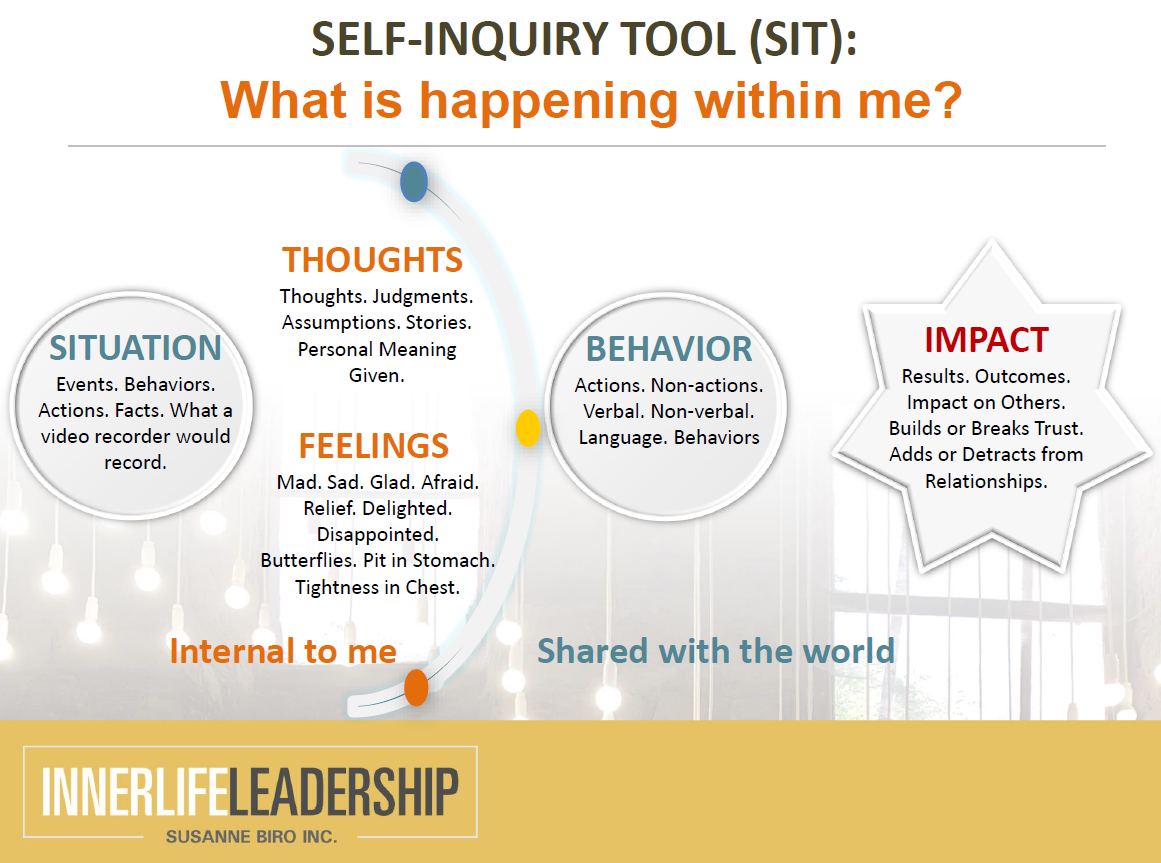FORBES: Between Stimulus and Response, Where Are You?

As featured in Forbes
Your CFO resigns. A merger proceeds. A key leader is let go. You lose a major deal. Your direct report handles an important task poorly. A water pipe bursts in your home. Authorities warn of a pandemic virus. Your children make decisions you wish they didn’t. Your spouse uses a certain tone of voice. World leaders take actions that scare and affect us all.
How do you react?
Do you find yourself wanting to vent to anyone who will listen, perhaps instantly taking to social media? Do you look for someone or something to blame, righteous about the fact that this should not be occurring? Do you allow yourself to feel hurt, angry, scared, sad or disappointed? Or do you mostly cover up your real emotions with a facade you believe to be more socially acceptable? Perhaps you shut off, go numb and, as Brené Brown put it, “have a couple of beers and a banana nut muffin.”
On the other hand, maybe you find yourself relaxed and able to easily lean into the event. Are you open, curious about the news and eager to research it fully, taking nothing at face value? Do you focus on any opportunity the event could bring? Perhaps you are quick to see the humor and you use the event as material for your next comic routine.
Between stimulus and response, where are you?
We may all react in any of the ways listed above. Sometimes, we are genuinely curious and can focus ourselves to improve or advance a situation. Other times, we quickly find the humor and use it to steady ourselves and others for a future we had not quite anticipated nor wanted. Then there are those times when we are in shock: emotionally triggered, overwhelmed, unable even to think and so we seek out someone who will listen, all in an effort to make sense of what has occurred.
How we react depends on how we think of ourselves and the meaning we give an event: something occurs and instantly, our internal narrative — who we think we are (our self-identity) and how we believe events should unfold and people should behave — is activated.
Pay attention: this is our moment to awaken!
Between stimulus and response lies our greatest opportunity to advance our leadership. It is only in this nano space that we can decide our identity and attribute meaning in a way that can most effectively direct our own and others’ attention and energy.
There is a quote, that has evolved over time, but can be traced back to psychologist Rollo May. It goes like this: “Between stimulus and response there is a space. I will meet you there.”
Between stimulus and response is our one rare opportunity to see what we are otherwise blind to: the box we put ourselves and others in, our internal narrative and habitual meaning-making patterns.
If we study ourselves — which is the work of leadership development — we can observe our usual ways of thinking about ourselves, interpreting events and our very predictable response. Ask yourself:
- What just happened?
- What did I just say to myself about what happened?
- What did I tell myself about what this means for me? About me? About who I tell myself I am?
- Is this a meaning I often give to events, an old identity, one that perhaps is no longer useful?
What usual fear do you often (re)activate within yourself?
Knowing your answer to this question is important, but knowledge alone is insufficient. We must be able to intervene between stimulus and response if we are to lead with the executive maturity required. Being able to slow down and recognize the space between — our one moment to be conscious and to intentionally choose how we think of ourselves, our role in it and an event — can be some of the most important work we ever do.
So, the question again:
When something happens, how do you typically respond?
Consider something relatively benign, like your spouse forgot it was garbage day. Or you have been overcharged by your telecommunications company.
How do you respond? What happens within you? What do you think and feel, and then what actions do you take? What is the impact of this behavior? Are you as effective and gracious as you could be? Would like to be? As would best serve others and your organization’s bottom line?
Now consider something more serious, an event with larger consequences. What recent event upset you so much that you were unable to handle yourself well?
- What happened?
- What is the first thought that came to your mind?
- What story did you tell yourself about what this meant for you? About you?
- Notice if this is a familiar story (e.g., I always get screwed over).
- Based upon that story, how did you respond? What was the outcome?
- Notice now, in hindsight, other ways you could have responded. Consider someone you admire: How would they interpret the same event? How would a different interpretation have changed your story and then the outcome?
Life rarely, if ever, concedes to our expectations. Sometimes, the events of our lives are “better” than we expect and sometimes they are “worse,” but they are almost always different from our expectations. Therefore, it would serve us well to learn more about ourselves and how we react to external events, because the more we know about ourselves, the more we can steady, focus and direct ourselves. The more we steady, focus and direct ourselves, the more effectively we can lead others.
One thing is certain: senior-level leadership will magnify immature ways of reacting as surely as alcohol and money magnify personality. We can all be highly reactive. See if you can find the conscious space between an event and your response today.

